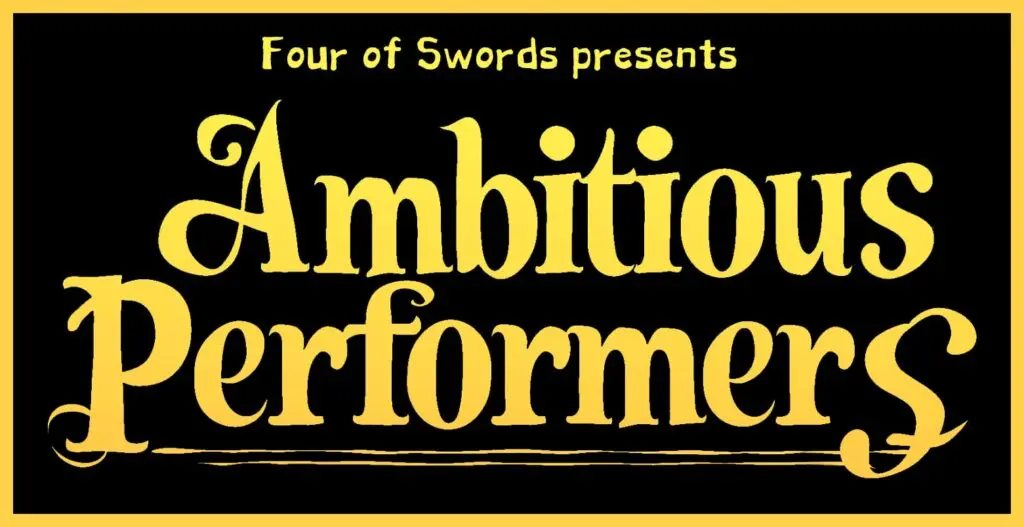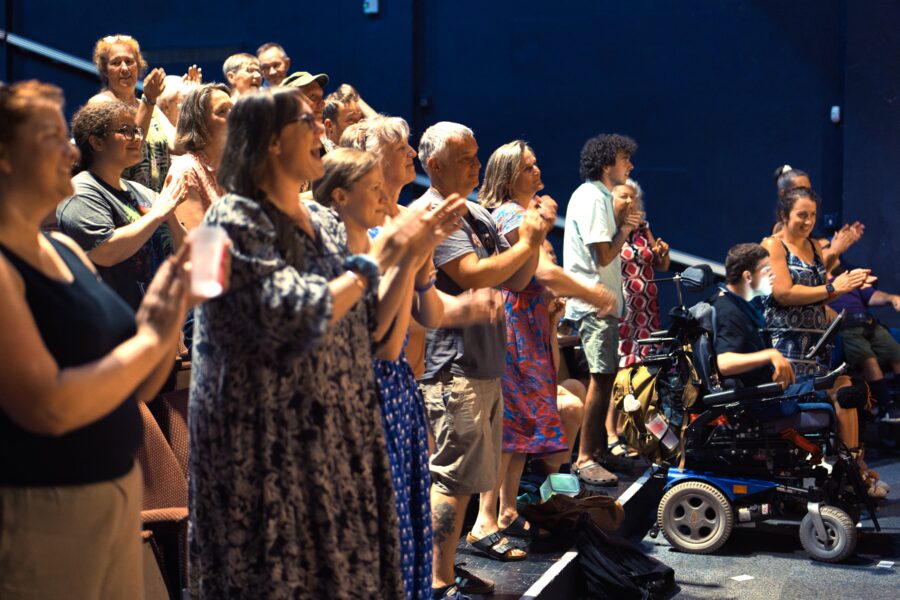
Exeter is a city which prides itself on its arts community – a Unesco City of Literature, a University city boasting ten theatre societies to date – but the elitism of local theatre industries continues to ensure an uphill battle for those who want to make something of their art. For the neurodiverse community in particular, whose skills and abilities are often undermined, local theatre poses the opportunity to join a network of passionate and like-minded individuals. Sarah White and Philip Kingslan John, co-founders of local theatre company Four of Swords and its subgroup Ambitious Performers, are working from the fringe of Exeter’s theatre industry to transform local theatre in the spirit of inclusivity.
Sarah White and Philip Kingslan John are working from the fringe of Exeter’s theatre industry to transform local theatre in the spirit of inclusivity.
Philip opened up to Exeposé about his journey “teaching young people in multi-sensory ways” as part of a “creative endevour” to cut through the elitism of theatre. His own theatrical journey started in his 20s. He had “fallen into that belief that a career in the arts wasn’t really viable,” but his “great desire to do something artistic” encouraged him to balance his passion for amateur dramatics – or am-dram, as it’s often known – with his teaching job in London: “I had a job teaching in London, but I was coming back at the weekends to try and direct. It was a weird existence, but because I never went to drama school or had any sort of training, I guess it was my formative period.”
For Philip, the am-dram community was one which refused to conform to the elitist standards of the theatre industry. “Am-dram has that kind of community feel to it,” he told us. “Everybody helps each other out. It was through am-dram that I met Sarah White. She and I both had day jobs that we weren’t really enjoying.
“We had a desire to create something, but we didn’t call it immersive at first – immersive wasn’t really a concept in the same way that it is now. We wanted to do something which was accessible, provocative, that wasn’t elitist in any way. We wanted to get away from that feeling that you can get in theatre, of it being an elitist artform.” And thus Four of Swords was born. Philip and Sarah, co-founders of the company, have used the company as space for immersive, educational and experimental theatre since its debut performance in 2013.
We wanted to do something which was accessible, provocative, that wasn’t elitist in any way. We wanted to get away from that feeling that you can get in theatre, of it being an elitist artform.
Philip Kingslan John
“As an artist it’s your duty to get out there, and not having enough experience isn’t an excuse,” Philip says, citing Alan Moore’s Writing for Comics as a motivator for this experimental attitude. He admittedly “hadn’t had any training working with disabled or learning-disabled young people, and [at the time] neurodiversity wasn’t a popular term like it is now.” Despite this, it all started to come together when he met a group named the Pelican Project at a planning meeting for a festival. The festival never actually went ahead, but what did come out of this meeting was his introduction to “a group which was formed to fill the gap for learning-disabled school leavers.” Philip realised he “wanted to engage with the community.” He embodied the Alan Moore mindset.
He continued, “It was through the Pelicans that I met Isobel Jeffrey. She had a bit of extra cash and the desire to improve her skills as an actor, so she employed me as a tutor and mentor on a one-to-one basis. That’s how it all snowballed. It was through working with Isobel that we came up with the idea for the Cabaret, which has become a regular thing, and then the idea for the Ambitious Performers. I’ve got her to thank for all of that, she was the catalyst and the inspiration behind it all.”

A local actress, Isobel Jeffery is a veteran performer at a number of Exeter’s venues. Meeting her was enlightening; her ideas and creativity seemed entirely endless. A particular highlight was hearing her plans for the ongoing and locally-acclaimed Madame Thespia’s Deliciously Diverse Cabaret, which has been supported by Exeter Phoenix, Exeter Northcott, The Pelican Project and Libraries Unlimited. She has also appeared in another original production, The Magical Screentest of Isobel Jeffery, which took place in the Exeter Phoenix last May. According to the Exeter Phoenix, it portrays “the heroic, poignant tale of how [Isobel] has worked to overcome learning disabilities and health problems, and fought to overcome other people’s limiting preconceptions of what she might be capable of.”
A local actress, Isobel Jeffery is a veteran performer at a number of Exeter’s venues. Meeting her was enlightening; her ideas and creativity seemed entirely endless.
Sitting in on the beginning of an Ambitious Performers session, it was impossible to ignore the flow of genuine warmth and creativity the group enables. The story Philip tells is an invigorating and hopeful one, but behind it is the task of funding a local organisation which a community now relies on, amid closures to significant local venues which serve them. “For ages we only ever got funding from the Arts Council, with the exception of the Wellcome Trust, but latterly we’ve gotten income from a wider range of sources, a few local charities. The big problem is that the smaller local charities don’t often offer a very substantial amount of money. As a freelancer, you’re trying to value your work and your time, and [the funding is sometimes] a problem,” he told us.
The big problem is that the smaller local charities don’t often offer a very substantial amount of money.
Philip Kingslan John
As for the venue closures? “I don’t know how Exeter compares to other cities, but I feel like the main problem at the moment is a lack of an alternative, fringe-y, blackbox-y venue. The Bikeshed, where The Bootlegger is now, was amazingly impactful. It was a cool stop-off for small-scale, interesting stuff. Then it closed. MakeTank on Sidwell Street was, again, a valuable and welcoming place. Now that that’s gone, I feel like we need a replacement.”
When asked whether the Northcott – which describes itself as “Exeter’s Flagship Theatre” – has the potential to fill these gaps, Philip responded, “[The Northcott] would like to try to be more fringe-y, but it’s the fact that it’s the Northcott – it’s all kind of tied up. You want something a little bit more irreverent or independent. The Barnfield do incredibly cool stuff, and they have an amazing team there, but it doesn’t have the same feeling as something truly independent and not beholden to anyone.”
Ambitious Performers has opened its doors for creatives in Devon’s neurodiverse community, offering an inclusive space for a diverse group of talented individuals. Philip feels that the work he and Sarah do is “really gratifying, and it shows the power of teaching young people in multi-sensory ways.” Exeter’s theatrical sphere for ambitious neurodiverse people isn’t going away anytime soon, but the need for a fringe-adjacent performance space and consistently reliable funding continues as Ambitious Performers grows in both its numbers and its creative endeavours.
A shortened version of this updated article was originally published in Issue 766 of Exeposé.


